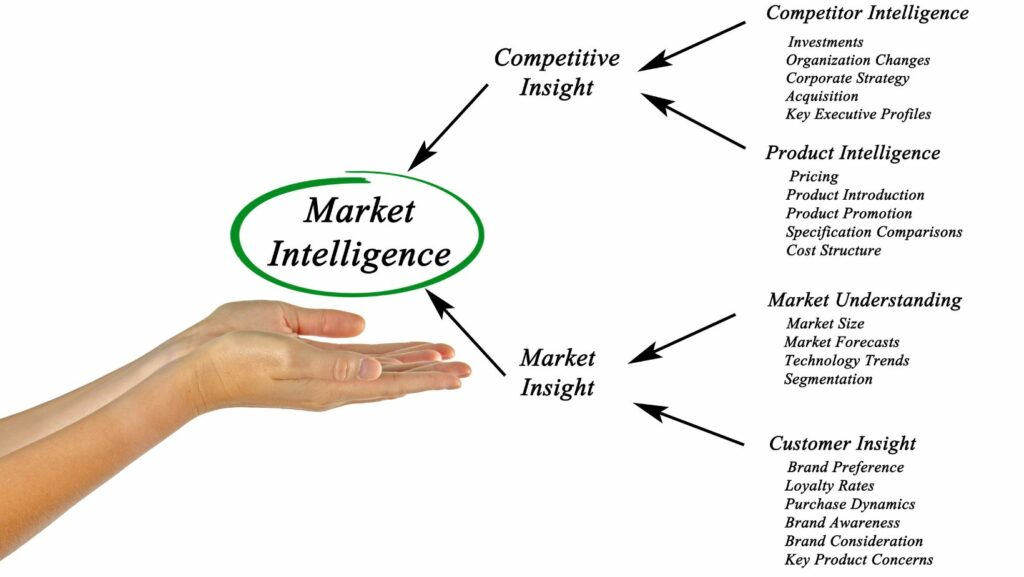In today’s hyper-competitive business environment, staying ahead of the curve isn’t just an advantage; it’s a necessity. Market intelligence analysis tools have emerged as pivotal assets in deciphering market trends and consumer behaviors, enabling companies to make informed decisions swiftly and efficiently. These tools provide crucial insights that can significantly impact a business’s strategy and its bottom line.
Market Intelligence Analysis Tools
 Market Intelligence Analysis Tools are pivotal in understanding current market dynamics and consumer behavior, translating complex data into actionable insights for better strategic decisions.
Market Intelligence Analysis Tools are pivotal in understanding current market dynamics and consumer behavior, translating complex data into actionable insights for better strategic decisions.
Market intelligence encompasses the processes and technologies that enable organizations to gather, analyze, and interpret data related to their market’s environment. It primarily focuses on deriving actionable insights that inform strategic business decisions and enhance competitive advantage. This intelligence is sourced from various data points, including competitor analysis, market trends, and consumer preferences.
Key Features of Effective Tools
Effective market intelligence tools exhibit several key features that enhance their utility and efficiency:
-
Comprehensive Data Collection: These tools integrate data from diverse sources like social media, financial records, and market surveys to ensure a well-rounded analysis.
-
Real-Time Analytics: They provide real-time insights that allow businesses to react swiftly to market changes and opportunities.
-
User-Friendly Interface: Accessibility is enhanced through intuitive dashboards and interactive reports that simplify complex data interpretation.
-
Advanced Analytical Capabilities: Incorporating predictive analytics and machine learning, these tools forecast market trends and consumer behaviors with high accuracy.
-
Scalability: The tools adjust to varying data volumes and business growth, making them suitable for different sizes and types of businesses.
-
Collaborative Features: Facilitating teamwork, these tools support sharing and collaborative analysis, which is vital for aligning strategic initiatives across departments.
These features ensure that businesses can leverage market intelligence tools effectively to maintain competitive advantages and adapt to rapidly changing market conditions.
Top Market Intelligence Analysis Tools in 2021
In 2021, a range of market intelligence tools stood out for their superior capabilities in processing and analyzing business data. These tools have become essential for companies aiming to gain a competitive edge in their respective markets.
Tool 1: Features and Benefits
 Tableau: Tableau excels in data visualization and business intelligence. Users value its drag-and-drop feature that simplifies the creation of interactive and shareable dashboards. Its benefits include the ability to connect to various data sources such as SQL databases, spreadsheets, and cloud databases like Amazon Web Services. This connectivity allows analysts to generate real-time insights from complex datasets, fostering informed decision-making. Moreover, Tableau’s strong community and extensive resources ensure users can maximize the tool’s functionality to benefit their business needs.
Tableau: Tableau excels in data visualization and business intelligence. Users value its drag-and-drop feature that simplifies the creation of interactive and shareable dashboards. Its benefits include the ability to connect to various data sources such as SQL databases, spreadsheets, and cloud databases like Amazon Web Services. This connectivity allows analysts to generate real-time insights from complex datasets, fostering informed decision-making. Moreover, Tableau’s strong community and extensive resources ensure users can maximize the tool’s functionality to benefit their business needs.
Tool 2: Features and Benefits
Power BI by Microsoft: Power BI stands out for its seamless integration with other Microsoft products, such as Excel and Azure. This integration empowers users to incorporate existing workflows and data systems easily, enhancing productivity. Key features include real-time dashboards, data warehousing capabilities, and advanced data governance tools. The tool’s benefits extend to its cost-effectiveness and scalability, making it suitable for both small businesses and large enterprises. Additionally, Power BI offers extensive security features, ensuring that data handling and insights derivation are secure, which is crucial for maintaining corporate data integrity.
How These Tools Empower Businesses
Enhancing Competitor Analysis
 Market intelligence tools analyze data to deliver detailed competitor assessments. With tools like Tableau and Power BI, businesses access deep dive analytics that reveal competitors’ strengths, weaknesses, market share, pricing strategies, and customer engagement levels. For example, by integrating various data sources, Tableau offers insights into competitor marketing tactics and sales performance. Similarly, Power BI utilizes its robust integration with Microsoft ecosystems to provide real-time competitor activity tracking. This capability empowers businesses to spot competitive threats quickly and adapt strategies in responsive, impactful ways.
Market intelligence tools analyze data to deliver detailed competitor assessments. With tools like Tableau and Power BI, businesses access deep dive analytics that reveal competitors’ strengths, weaknesses, market share, pricing strategies, and customer engagement levels. For example, by integrating various data sources, Tableau offers insights into competitor marketing tactics and sales performance. Similarly, Power BI utilizes its robust integration with Microsoft ecosystems to provide real-time competitor activity tracking. This capability empowers businesses to spot competitive threats quickly and adapt strategies in responsive, impactful ways.
Improving Market Trend Recognition
Recognizing shifting market trends quickly is crucial for maintaining a competitive advantage. Market intelligence tools excel in identifying and analyzing these patterns by collecting and processing extensive datasets in real-time. Power BI and Tableau, for instance, offer advanced visualization features that transform complex data sets into clear and actionable insights. These visualizations help businesses spot emerging trends, such as changes in consumer preferences or new market opportunities, enabling proactive adjustments to product offerings and marketing strategies.

